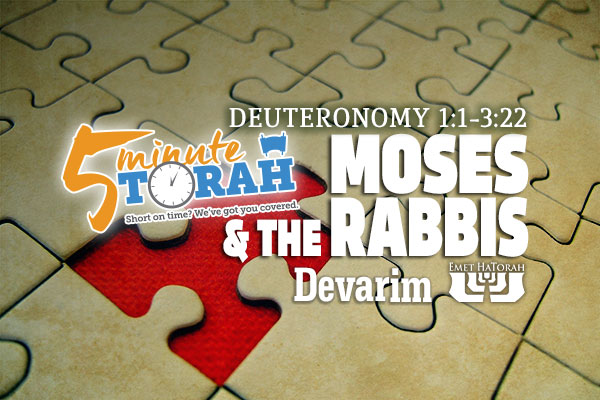Parashat Devarim - Deuteronomy 1:1-3:22
Series:

Moses and the Rabbis
Our parashah begins the final book of the Torah, the book of Deuteronomy. Sometimes the book of Deuteronomy is also known as Mishneh Torah, or the Repetition of Torah, since it contains a recap of many of the major themes included the previous books of the Torah. It also begins by recounting the various events that have taken place among the Children of Israel since the Exodus. A curious statement is made, however, that we must explore:
Beyond the Jordan, in the land of Moab, Moses undertook to explain this law, saying … (Deuteronomy 1:5)
The Children of Israel had wandered in the wilderness for the last forty years and had now made it to the land of Moab on the east side of the Jordan. But rather than immediately sending them over, Moses stops and begins to explain some important details of the Torah. What were those details? That’s a really good question.
Many people make the mistake of thinking that every detail of the Torah’s instructions is spelled out within the Torah itself. However, we have plenty of examples of why this cannot be the case. The most obvious is that of Shabbat, the Sabbath. For instance, the LORD commanded the children of Israel to keep the Sabbath, and that anyone who profanes the Sabbath shall be put to death (Exodus 31:14–15). However, the Torah does not provide any details of what types of work are considered to violate the Sabbath. Since the elders of Israel are responsible for trying cases such as this to determine if the crime is worthy of such a serious decree as the death penalty, it becomes immediately apparent that the definitions of “work” and “profaning the Sabbath” are critical in judging the outcome of such cases.
Two questions immediately arise: What constitutes work, and who has the authority to interpret the definition of work? In other words, does each person have the ability to determine what is work for themselves, or is there a common standard established that all of Israel must adhere to? Details and decisions like this had to be made clear to the Israelites before Moses departed. As we can see alluded to here in our parashah, these details were explained to the Children of Israel (vs. 5), reminding them that the heads of the tribes had been given charge of making legal rulings on his behalf under the leadership of Joshua (vs. 9–18), and that since their authority was given to them by Moses, it also came “from Sinai,” as recorded in Pirkei Avot:
Moses received the Torah from Sinai, and transmitted it to Joshua, Joshua to the Elders, the Elders to the Prophets, and the Prophets transmitted it to the Men of the Great Assembly. (m.Avot 1:1)
These legal decisions were at first recorded orally, and then eventually written down at a much later date. They were passed down from one generation to the next in order to equip the leaders among the people of Israel. The Oral Law, or the Mishnah, therefore, is the compilation of legal decisions and case precedents passed down from generation to generation beginning with the time of Moses. Before it was ever written down, it was taught orally from teacher to student in order that it remain flexible, but not be forgotten. After the destruction of the Second Temple during the Roman period, it became important for this information to be collected and committed to writing so that it not be lost. This compilation has served as a collective repository of these oral transmissions ever since. It is a critical component of Judaism, detailing the specifics of how the Torah is to be lived out, and determining the legal definitions of what it means to either break or fulfill the commandments found within the Torah.
The Torah was given as the skeleton, intentionally lacking in many details how it is to be observed. It is the job of the rulers of Israel to put flesh on it by explaining how it is to be lived out. This is why Yeshua can confidently say, “The scribes and the Pharisees sit on Moses' seat, so do and observe whatever they tell you” (Matthew 23:2–3). The scribes and Pharisees in the days of Yeshua would eventually become the rabbis of the Mishnah and Talmud.
Do they disagree with the decisions of Yeshua and the Apostles? Occasionally, but not that often. We have to remember that sometimes lower courts and higher courts disagree, but it is always the higher court’s ruling that stands. Even though the higher court may come to different conclusions than the lower courts, it does not disband the lower courts, but trusts them to handle rulings until the time is needed for it to intervene. Yeshua entrusted the leaders of Israel to continue leading his people in his absence, with the ultimate authority lying with him and his Apostles.
The next time we casually dismiss something as being “rabbinic,” let’s remember that if Moses had to expound on the Torah to make it viable for those living in his day, how much more so do we need exposition of its principles today by those who have been entrusted with its wisdom.








